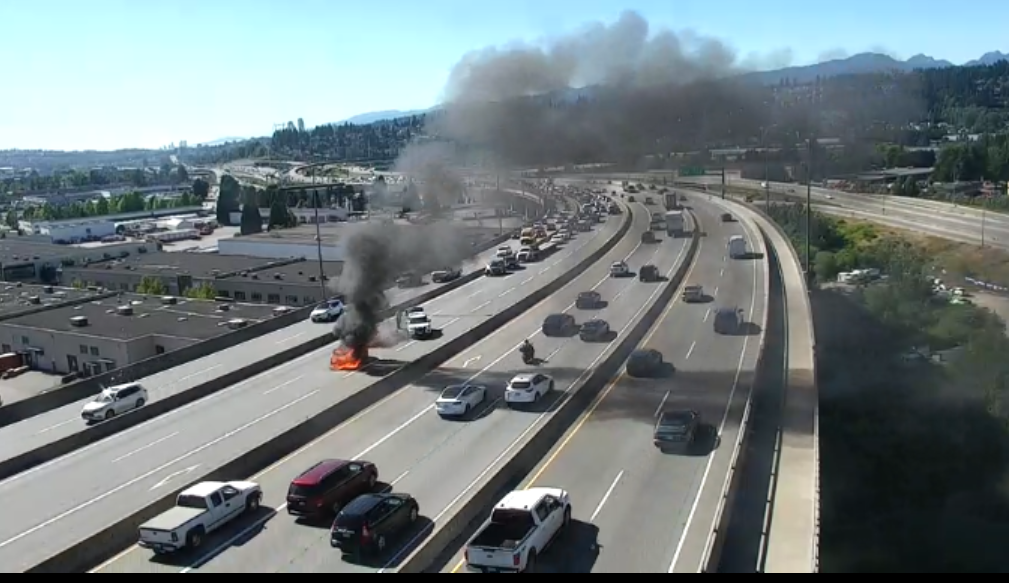
Vehicle fires happen on BC highways – especially heading up mountain passes such as the Coquihalla.
That’s the bad news. The good news is most fires can be prevented with adequate maintenance on your car, truck or recreational vehicle.
Here are a few things you and your mechanic should keep an eye on.
Vehicle Weight
It is extremely important to know (and adhere to!) how much weight your vehicle is designed to handle. That means being familiar with your towing capacity and load. An overloaded engine has to work harder than designed, which causes overheating and possible fire. Whether towing a trailer or not, it’s a good idea to keep an eye on your temperature gauge, especially when climbing mountain passes.
Cooling System
A vehicle’s cooling system has a very important job, and should be regularly maintained according to the manufacturer’s recommendations. The engine coolant reservoir should be checked frequently and topped up to proper levels.
Oil Leaks
It may be tempting to put off sealing that oil drip you spot on the driveway, especially if it seems small. But any petroleum based fluids and lubricants – whether from the engine, transmission, or power steering – can fuel fire. Leaks should be sealed immediately before accumulating around the engine and chassis or coming into direct contact with a heat source, like the exhaust system.
Exhaust Leaks
Exhaust systems start at the engine and run the length of a vehicle. And it’s hot – very hot. It’s no surprise, then, that exhaust leaks can cause fires.
Electrical
You just installed a bumpin’ aftermarket sound system in your car. But did you do it right? Incorrect installation of stereos, batteries, starters and other electrical items can lead to fire. Wiring under the hood should never be too close to anything that gets very hot.
If your vehicle ever does catch fire, stay calm, and pull over as quickly and safely as possible. Turn the engine off and get yourself and any passengers out of the vehicle and well away. Don’t return to retrieve your wallet, purse, cell phone, or any other object. It’s not worth it. Move everyone well away from the burning vehicle and call 9-1-1. If your cell phone is in the vehicle, flag a fellow driver down for the call.
Parking Tip
Don’t park your vehicle offroad where there is tall, dry grass and shrubs. When a vehicle’s hot undercarriage comes into contact with dry vegetation, a wildfire could start!
Do you have a vehicle fire prevention tip? Leave it in the comments section below.
Perhaps it is time for mandatory vehicle inspections for older vehicles. Tires do not last the life time of a vehicle even if it has low mileage – rubber deteriorates. Too many RV owners travelling the highways with there propane tanks on – there should be penalty. Etc, etc.
Hello Marjie and thank you for your comment. We have shared this suggestion forward on your behalf. Safe travels!
Use caution when transporting flammable fuels, even in small quantities. Camp stove fuel canisters in particular can fail and release into a vehicle causing serious issues
A great tip – thanks for sharing Pat!
Nesting rodents causing bare wires.
Thanks Liam, for bringing this one forward. Yes, this can be source of vehicle fires. People who live in rural areas, should check under their hood, if their vehicle hasn’t been driven for awhile.
Hi, folks! Can you please credit this photograph to Tim Pierce, with a link to the original image at https://www.flickr.com/photos/qwrrty/3863303704/? This photo is published under a Creative Commons license, so it’s absolutely fine for you to use it, but the license requires crediting the author for the use of the image. Thanks!
Hi Tim!
Thanks for connecting with us about your image. We apologize for that oversight and have updated the image and the link associated with it. Thanks for making your great photo available for sharing.
No worries, I appreciate it very much! I love that you’re able to use it to illustrate this article so effectively 🙂
Hi Ken, Thanks for that excellent advice about watching for rodent activity around your vehicle’s engine. This is likely something that most people don’t think about…and as you say, it could have disastrous results.
Fire prevention tips eh…I’m a mechanic and can agree with all of the above but I have to add another, car owners please please PLEASE once in a while, open the hood of your car and take a look underneath. I do know that on the lower mainland critters like rats, mice etc. like to nest under the hoods of cars, chewing wires, building nests with flammable materials. If any of these materials or wires contacts extremely hot exhaust parts or short circuits…well I don’t think I need to tell you what could happen.
So if you do leave your vehicle parked for extended periods of time, do look under the hood before starting that engine, could save you a ton of headaches later on. Ever a few days can give the critters enough time to build a nest or eat their way through wires, they especially love ignition wires as I’ve seen.